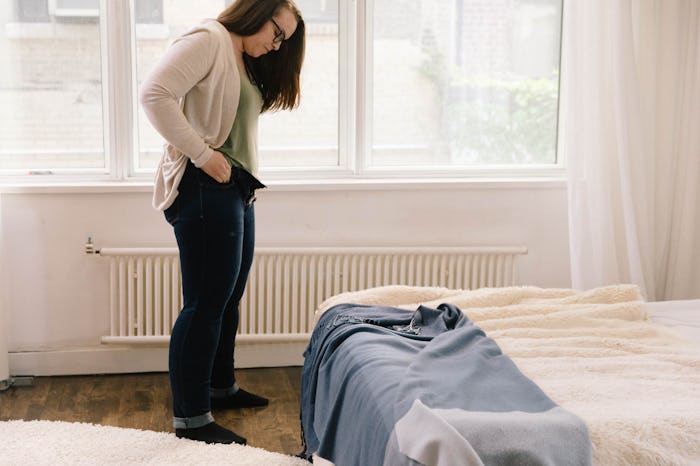Truth time. Pregnancy and childbirth put your body — and especially your pelvic floor — through the wringer. But for some reason, very few people are willing to warn you about the often unpleasant, and sometimes painful, physical realities of life postpartum. If you're wondering, why do I pee when I sneeze after giving birth? you absolutely deserve to know what to expect from your body in the coming weeks and months after baby.
If you pee when you sneeze (or laugh, or cough, or exercise), you're experiencing what's known as stress incontinence, according to Mayo Clinic. Romper spoke with Stephanie Prendergast, MPT and co-founder of the Pelvic Health and Rehabilitation Center, who explains that though statistics vary, "roughly 50 to 80 percent of women experience postpartum urinary leakage." For many new moms, stress incontinence comes as an unpleasant, and particularly embarrassing, surprise. As Prendergast notes:
"In many other countries new moms are immediately given postpartum physical therapy visits to identify and correct these issues. This is not the case in the United States, but it should be."
Whether you had a C-Section or vaginal delivery, giving birth takes a heavy toll on your abdominal wall muscles and pelvic floor. Even before birth, the physical stress of pregnancy may damage fascia, ligaments, nerves, and muscles crucial to controlling urethral anatomy, according to a study in the Journal of Prenatal Medicine. Can damage be prevented?
Prendergast notes:
"While there is no sure fire way to prevent postpartum pelvic floor issues, there is benefit to rehabilitating the problems that do occur, and the sooner the better. This helps prevent problems later in life such as incontinence, prolapse, and pain."
Pregnant women are often told to do Kegels, but you can't rely on these exercises to prevent stress incontinence after you give birth for the simple reason that your pelvic floor isn't the same as Jane's from next door. "Some people need to stretch, some people need to strengthen, some people have motor control issues and cannot do either without guidance," Prendergast explains.
I sure hated doing those darn exercises, and according to Prendergast, as a first-time mom under 35, I probably didn't need them. That's because your pelvic floor isn't just lazing around all day. In fact, it never rests. Unless you give birth, the muscles supporting your bladder, rectum, and pelvis are already strong, and living their best life.
Trouble usually starts after you have your first baby, and at that point, Kegels probably won't solve your urinary incontinence — especially if the abdominal walls are involved. Prendergast recommends the more comprehensive MuTu System to rebuild strength, and encourages women to keep in mind that hormones also play a role in incontinence — especially if you're breastfeeding.
So, when can you stop carrying a change of underwear in your purse in case of a sneeze? For some, the problem goes away on its own. For others, it lingers. Prendergast advises seeing a pelvic floor physical therapist if you're still struggling with stress incontinence after six months. If that's you, don't feel you have to hide — a pelvic floor physical therapist can get you jumping, coughing, laughing, and sneezing fearlessly again soon.
